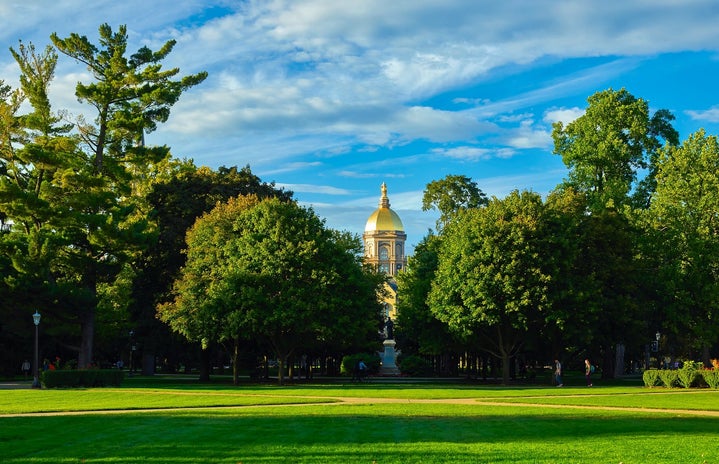It’s no small secret that college campuses are very often found to be the hot spot of sexual assault cases and areas that perpetuate rape culture. However, the articles you see shared on Facebook or covered by the morning news don’t tell you how faculty and students on these college campuses are trying to raise awareness about what sexual assault is, what rape culture is and how it is shown on their very own campus, and what it’s like to be on every end of the spectrum.
At Appalachian, this academic year alone there have been two separate weeks set aside to hold events to raise awareness and educate the campus. In November, Appalachian students put on Rape Culture Awareness Week, hosting events such as a #RapeIsWhen photo booth and a 1 in 4 Day of Protest and Solidarity that would educate students and faculty on what rape culture is. Rape culture is a concept that examines a culture in which rape is pervasive and normalized due to societal attitudes about gender and sexuality. The events had a great turn out, especially at the Red Flag Training, which aimed to educate the attendants on “how we as peers can be better “Upstanders” and speak out when we see potentially dangerous situations related to sexual, interpersonal and dating violence.” Participants were shown how to handle a potentially harmful situation, and what resources are available on Appalachian’s campus. This past month during the first week of February, Sexual Assault Awareness Week was promoted by Appalachian’s Women’s Center and Delta Sigma Phi Fraternity. The goal of the awareness week was to engage and educate the campus about sexual assault and how as peers we can work towards being part of a solution to end it. Events such as “Why Manning Up Hurts”, a second Red Flag Training, and a panel by OASIS were presented to students.
Rachel Clay, senior at Appalachian State, is heavily involved with ending rape culture on campus and has not only attended every awareness event put hosted some as well. When asked about what she saw was the most perpetuated idea of rape culture on this campus she said, “[Much of the time] there isn’t really any accountability for people who perpetuate sexual assault. There is underreporting and attention [about sexual assault] until the event takes place, and there isn’t accountability for perpetrators. The focus is on bystanders [interaction] and taking care of victims after the fact. There is continuous promotion of response from bystanders but not stopping the perpetrators. You might stop someone from sexually assaulting your friend at a party, but what if the perpetrator violates someone else instead?”
As humans, we tend to put up a defense mechanism to protect our egos by believing that we did the right thing by helping out our friend, not thinking past that and seeing possibilities of any consequences that may cause.
Clay goes on to discuss how sexual assault prevention training that is directed to all male groups can actually perpetuates sexual violence. If you teach it once to one group, their defense mechanisms are raised because it then becomes a response and reactive mechanism when put in the situations. Also, it appears that there is not enough discussion of coercing during the sexually violent situations women are put in. Many victims finally consent to intercourse they don’t want, just so they can go to sleep. “We may tell people that “no means no”, but they don’t teach people to stop asking after they are told no… [because there is a] culture of compliance with college campuses, [and] how to [stop sexual assault] meetings are just not proactive.” The thing about sexual assault is that it is handled differently in the real world and in the college world we live in, Clay further discusses. “At university’s there is a different adjudicative process that’s why it’s so important to discuss here [on campus]… the real world is so different. You can educate perpetrators and see justice for victims; you can do preemptive and proactive strategies to help prevent it later on. Some think you can combat sexual assault with a syllabus, because it forces students to learn about it [privilege and oppression and intersectionality]. By adding a mandatory course to a General Education program, like the one Appalachian has, to educate students on rape culture, abuse, and the many issues that often go undiscussed or students are just unaware of, it is likely we can ease the minds of parents, students and society.
There seems to be a lot of discussion lately about how Appalachian administration isn’t “being there” for students, especially those who are victims of sexual assault. Clay says that she would like to see an increase in sanctions for sexual misconduct, because beneath penetration the minimum sanction is disciplinary probation, which is the same as being caught with marijuana. However, if you are caught selling marijuana you are suspended (see the issue here? Not to mention there isn’t really sanctions against same sex sexual misconduct). Also, under reporting is a big issue, why would someone report a sexual assault, if they aren’t sure their assailant wouldn’t be kicked off campus? Knowing that there is a perpetrator of sexual assault walking around campus can be a big trigger for someone who is a victim.
The university’s police station has a 24 hour line to report any sort of criminal offense on campus, as well as there is access to the Boone Police Department. However, it is often that a victim of sexual assault will not come forward for the simple reason that they don’t feel safe to, they are afraid that they won’t be heard or helped, or if word got out they would be shunned by their peers. There is a stigma of working with police, so victims won’t reach out to them.
To help victims feel more comfortable with coming forward, Clay says she would like to see the student conduct office do a better job of being open to students coming in to sharing their experience, and doing so knowing that they are safe. This is the best office and has the best resource for students to come to for events like sexual assault. Walk in hours would be helpful, it would increase the confidentiality, and by not having a set appointment there would be more anonymity to the student seeking help. Victims need to be able to be aware of the services Appalachian provides to protect victims from their assailants.
Appalachian University serves its students by helping them grow, and it also gives many students a safe haven. Instead of being unaware of all Appalachian has to offer, students need to be aware of how it can protect them, and how if given the event a student were to be assaulted that there will be justice served to further ensure safety on campus.
Images:
http://titleix.ucr.edu/images/sexual_assault.jpg
http://bcgavel.com/wp-content/uploads/2014/04/tumblr_inline_mn7tjoJsbc1qz4rgp.gif

